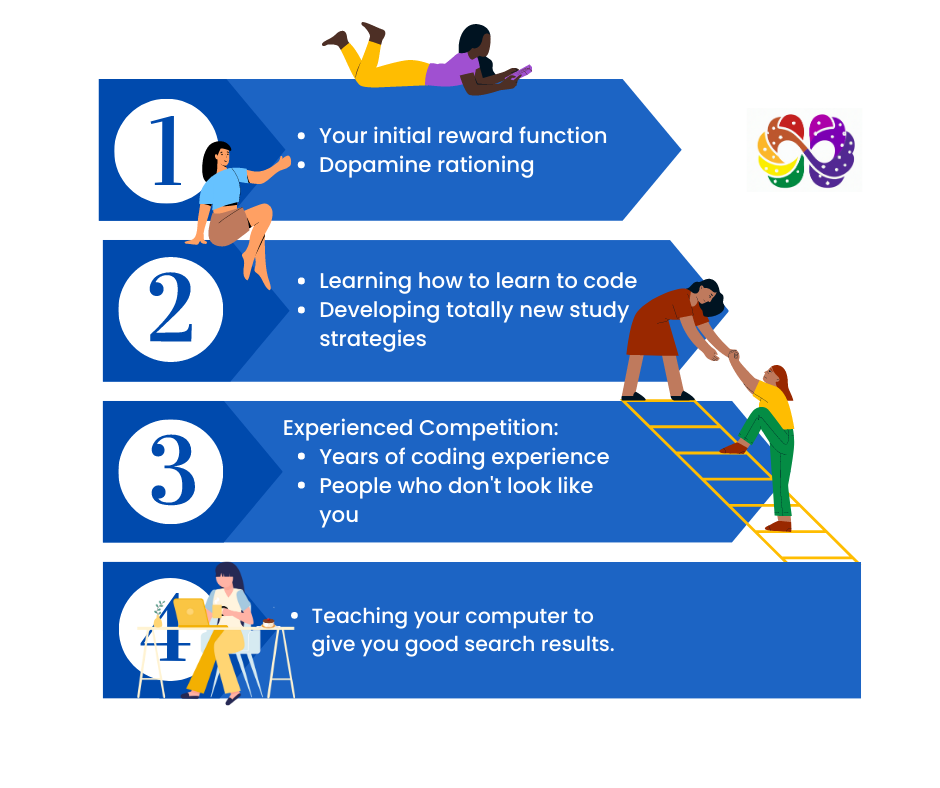Coding Classes
For Noobs
From one neurospicy #Indigenerd self-taught codergirl to the next. Learning to code is like learning a new language, except with some biological differences.
Why Coding Is Actually Hard
If you have a good teacher and enough time with a TA when you run into bugs, learning to code can be hard for unexpected reasons.

Step 1: Your Mentality
Do not compete with people who do not share your reality. Focus on passing and build-in more practice later to work towards closing the gap. You’re making up for lost time, rather than inferior ability.
- Fact: Coding is easier if you are good with foreign languages or have strong verbal reasoning IQ scores.
- Strong verbal reasoning also makes you more susceptible to anxiety because of how your mind races.
Step 2: Motivation
Breaks
Take 10min breaks every 30min.
- We recommend a Headspace meditation. Make sure you grab that student discount!
- It will take time to build your toolbox into long-term memory.
- If you do not take breaks, you are more likely to push the same two ideas you have through the computer over and over expecting a different result.
- Taking a break and optimizing it allows your brain to store it in the most effective way possible.
Play With Code You Do Not Understand (Vibe Coding)

Play with code someone already wrote, pasting functions into your IDE via…
- The digital version of your textbook.
- StackOverflow from a resolved issue that relates to your syllabus.
- If you are working in R, try using the functions on this website. They do build on each other in order for the code to run.
- Try this if you are working in Python.
- Create a GitHub and try to see what happens when you paste different bits of code into different files.
- Make a mess.
- As long as you’re playing with the code language you’re learning and some parts of the syllabus, use that dopamine and keep going!
Data Science Courses
When you are sitting at home struggling with task initiation, instead of drilling exercises, try assigning yourself something complex that you are motivated to build and uses the skills you will learn in the course as a prerequisite:
- Opening a data file on your special interest and graphing it.
- Try building a website in Quarto and publishing your work!
- Compatible with multiple languages so you can share what you built regardless of the language you are learning.
- Easy introduction to your command line.
- Rewarding.
- Prerequisite to a portfolio.
- The process is primarily non-coding.
- Uses the debugging skills that you will need.
For many of us who struggle with executive functioning, it’s not enough to understand the logical payoff of learning a skill with imaginary dopamine. We need to build dopamine snacks into the process, even if it means reading ahead, even if it means throwing out the textbook altogether.
Step 3: Code A Bit Every Day (Or Not)
- Half an hour of your peak productivity hours is plenty, but plan around your task initiation barriers if it is not realistic.
- Remember that doing a bit every day allows for your brain to consolidate what you learned overnight.
- When you skip coding days, you also undo the progress you made.
To Our Executive Dysfunction Squad:
- If you can only hyperfocus once a week, then acceptance of that reality is an accommodation you must give yourself. Do not force yourself to do a strategy that will not work for your brain.
- Skipping days may not be the most neurologically effective strategy overall, but that does not matter if it is not an alternative that is accessible to you.
- Working with the brain you have is more important and effective than studying “perfectly”.
Step 4: Ask for Help
- Ask for help and allow the person helping you to set up boundaries so that no one feels taken advantage of.
- Spread out who you get help from so that it is manageable for the people kind enough to help you.
